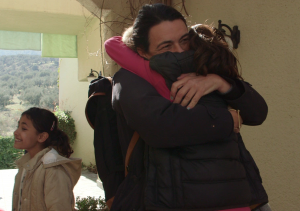Friday, June 15th at 7:00PM
This film is a result of the joint work done by filmmaker Karen Sztajnberg and Childhood Rescue Project leader Alessandra Gabriel/Lele Luiza.

In 2017, I joined my friend Lele Luiza, leading the Childhood Rescue Project, and set off for Athens to teach video-literacy to Syrian children. The idea was to share skills so they could better use their smart phones to tell their own stories. It was a remarkable, albeit obstacle riddled endeavor, which left me questioning such well meant, but often short-lived efforts. This film will explore the plight of this young refugee population, and the validity of such volunteer efforts.
STORY SUMMARY
This film is the unlikely combination of a road trip and a meta-narrative. It features Syrian children learning how to make films, and this happens on the road as educator Lele Luiza tracks down the kids she has been working with for the last two years. In going out of her way to maintain connection, she avoids being just another volunteer who came and went, remaining profoundly aware of the negative impact of repeated detachment.
We open the existing roughcut, with an introduction to the mission of the Childhood Rescue Project’s video literacy workshops. Then we start to map the children Lele met in her previous stays in Northern Greece, and have now been dispersed up and around Athens. We travel to them, teach the very basics of filmmaking, as well as play, chat, and eat together. The informality of this setting yields an insider glimpse of life as a Syrian refugee child growing up in limbo as they await decisions over which they have little control or say regarding their final destinations. We bear witness to their enthusiastic creative filmmaking efforts and appetite for play, as well as a disturbing growth of abrasive, rough and tumble behavior, which speaks of the inevitable anxiety of their circumstance. This escalates through the course of this film. The urgency here is to reveal what a ticking bomb Europe has on its hands as it fails to adequately absorb this population, instead leaving them to navigate a labyrinth of senseless delays and bureaucracy. The current roughcut ends with another tearful farewell, signaling the repeated scenes of “abandon” that these receptive, warm children are being subjected to, again and again. Thus, I remind my viewers of the perils of such well-meant volunteer efforts that result in short lived experiences.
My intended reshoot this summer will pick up these kids at their current locus. The vast majority has obtained asylum status in Germany, with a few families spread through Sweden, France, Ireland and one still marooned in Greece. We aim to go beyond the “where are they know” topicality and are curious to see how they can use the medium of film to tour us through their new found homes, their routines and the resilience of their creative spirit.